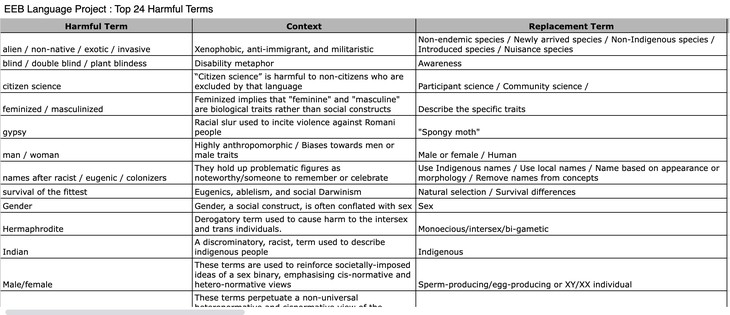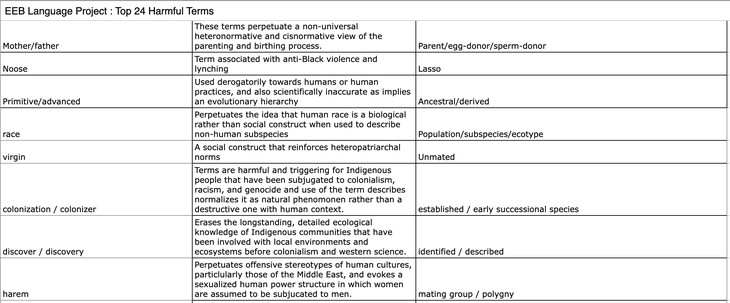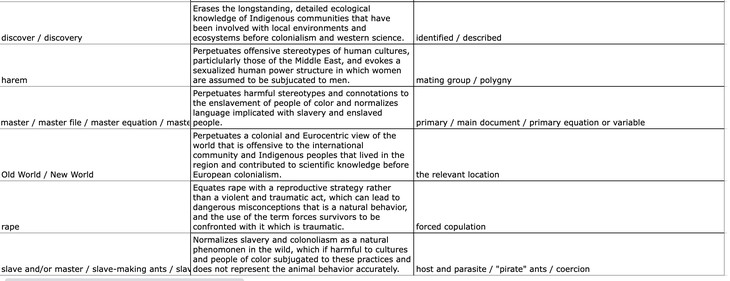It is tiresome to keep pointing this idiocy out, but we must because the woke are still winning the culture war. Every time we give up pointing this crap out and fighting back, the whiney woke whingers win another battle.
Today’s idiocy is being pushed on civilization by the so-called EEB Language Project, whose sole mission is to make us all dumber and more confused.
The group is composed of a bunch of over-credentialed and undereducated Ph. D.s, mostly in the sciences, who are determined to remove all meaning and precision from scientific language and replace terms that inform with ones that don’t exactly flow freely off the tongue.
The EEBers have created a repository of “harmful terms” that should be excised from our language. Terms such as “male” or “female,” “double-blind,” “man” or “woman,” “exotic” or “alien,” and “survival of the fittest.” You get the idea. Here are the top 24 prohibited terms, and they are soliciting more submissions for excision from language.



As you can see (I hope), there are plenty of long explanations for why terms that are in common use and fully understood must be replaced. They all boil down to “somebody might be offended” or, worse, “we think these violate some woke norm that must be observed for our benefit.”
Needless to say, all of this has to be resisted. Getting rid of the term “male” or “female” serves to obscure, rather than clarify meaning.
It is all absurd and misses the point entirely.
While some of these terms are utterly benign and the attempts to change them are based upon the ideological need to muddy the waters, I tend to be skeptical of the movements to change terms that indeed have wrongfully acquired negative meanings.
This struck me as I watched technical terms used in research and science morph into insults and become taboo. While I understand the impulse, the attempts to remove the stigmas attached to the words are bound to fail. The new terms will acquire the same stigma over time because the attitudes behind them have to change. Simply changing words does nothing to undercut the sentiment, which is the genuine problem.
You see this in the ever-changing development of racial slurs. “Colored” used to be simply a descriptor of people who are not White; that is why the NAACP has its name. For most of its history, it was the National Association for the Advancement of Colored People. It still has the common acronym as its name, but the full name has been dropped. The United Negro College Fund now refers to itself as the UNCF in its communications, because Negro acquired a negative connotation. Neither term is inherently a slur, although I sympathize with the desire to change the name now that some use them that way.
The same is true for terms attached to intellectual disabilities. Lots of terms have been used over the years to describe people with intellectual disabilities; each has had a purely scientific/descriptive intent, but the terms acquire a negative connotation over the years because of the prejudices attached not to the words, but to the people.
The Boston Globe has a fascinating article on how the word “retarded” became a slur. Ironically, the word replaced other technical terms that had acquired negative connotations in order to reduce the stigma of intellectual disabilities. Instead, it became the most abused of the terms and is now taboo to use.
The term “retarded” didn’t appear in the slangy, usually offensive sense until the mid-20th century. Frank Rooney’s 1954 novel “The Courts of Memory” contains an insulting use that should be familiar if not comfortable: “God, you’re simple, Dick. . . . You’ve got an I.Q. about equal to a squirrel’s. You’re retarded, do you hear me?” The Oxford English Dictionary offers an understated way of describing the current radioactivity of “retard,” “retarded,” and “retardation”: Each is “not the preferred term.”
Any variation of “retard” still carries a toxic feel for many. Peter Sokolowski, editor-at-large for Merriam-Webster, said such terms used to pop up often on the online Open Dictionary, which is user-generated, much like Urban Dictionary. Sokolowski said in an e-mail, “Since it was often impossible to tell whether the coinages were meant to be hurtful or playful, our decision was to reject those submissions.”
Some might be confused by the fact that “idiot,” “moron,” “imbecile,” and “feeble-minded” are thrown around casually, while “retard” is reviled. Sokolowski thinks this has to do with ignorance of word origins: “It’s surprising to people today that words like moron once had a scientific meaning.”
Originally “retarded” simply referred to the slower ability of some people to comprehend things–a developmental disability. It was never intended to have a negative connotation, but rather a description of a medical phenomenon.
It picked up the negative connotation because people are jerks, which is the real problem. As long as people retain prejudices against others, descriptive words for the thing they are prejudiced against will become infected with that prejudice over time.
We should focus on prejudice more than words. And the prejudice against people with intellectual disabilities is the real problem with the words we use to describe them. As long as people think it is OK to be cruel to others, people will be cruel. There is a whole ideology filled with adherents who want to kill off people with Downs Syndrome–they even suggest that they are curing the disease, not killing off people they disdain.
I would start with educating them; they likely think using a derogatory word for intellectually disabled people is horrific, but think killing them off is a moral imperative.
Quit focusing on the irrelevancies. Focus on the real problem: people who feel it’s OK to hate or treat others badly.
And keep your hands off descriptive language that works perfectly well, or better than the alternatives. “Male” and “Female” describe real phenomena. Leave the words alone.








Join the conversation as a VIP Member